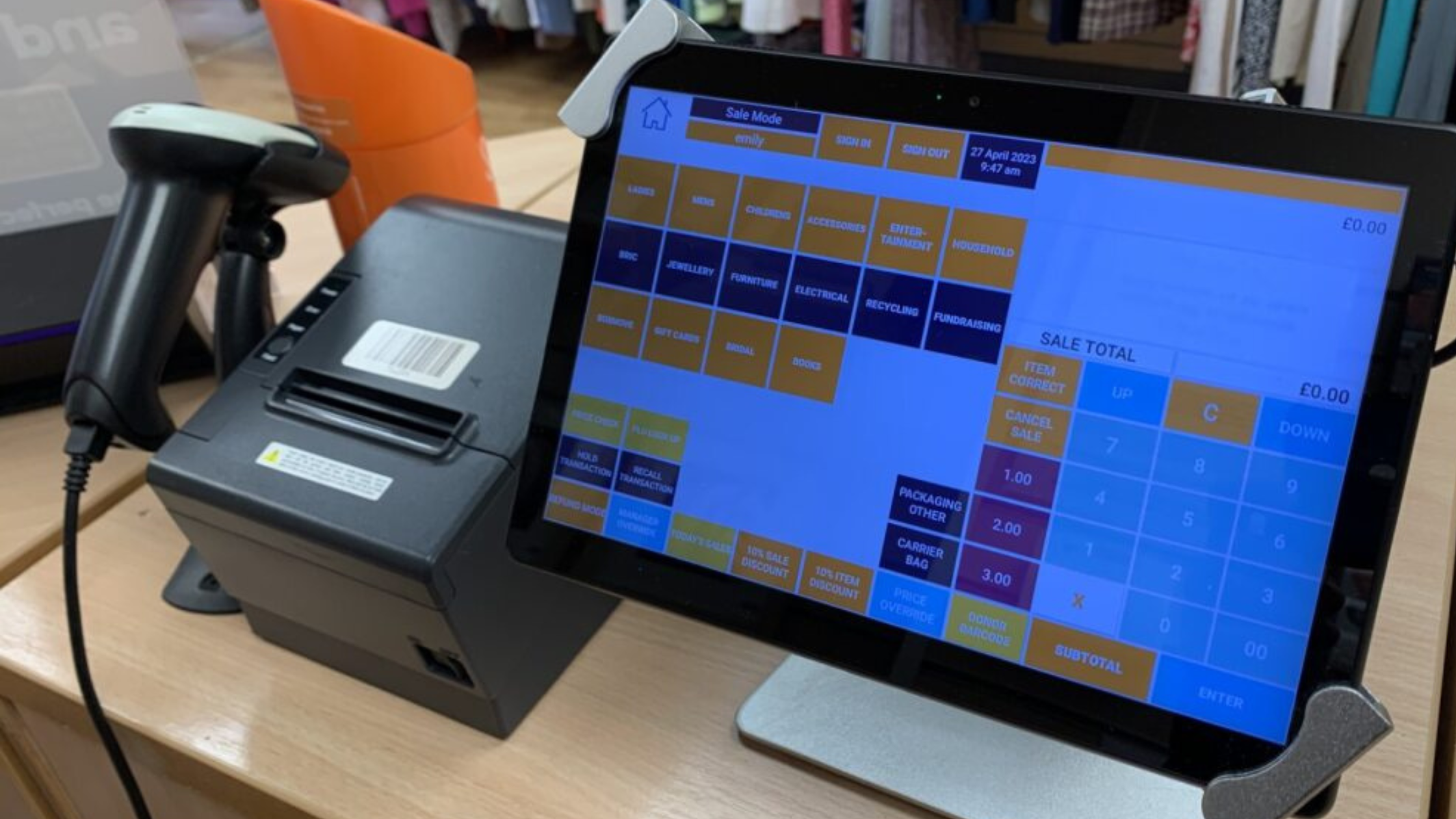
Finding the right supplier can be tricky. Beneath the sales pitches and enticing features lie the true markers of value – ones that directly impact your charity’s operations and costs, which occasionally might not be clear or identified upfront.
When budgeting for the cost of ownership of a charity retail system, the typical costs to consider are the capital expenditure on your hardware, as well as monthly expenses for software, and ongoing support. However, many charity shops find that numerous hidden costs come with a charity retail system that can considerably increase the true cost of ownership.
Let’s explore the key aspects to consider when evaluating charity retail suppliers.
Is your capital being well spent, and what else could it be doing?
Many charity ePOS systems require a huge capital outlay. For example, an estate of 50 charity shops at £3,000 per shop for hardware, training, and installation, equates to a capital expense of £150,000 before any monthly service charges are considered. This capital is diverted from other potential uses and is a difficult balancing act for some smaller charities – but this isn’t necessarily a hidden cost of ownership.
The hidden costs come from the traditional charity ePOS model in which the hardware is purchased with a five-year warranty and support contract. When this period ends, you’re free to maintain your current hardware without any ongoing costs. You own the hardware at this point, However, after four or five years, ePOS hardware will often reach its end of life or potentially face software compatibility issues, so it’s then that things start failing and repair bills begin adding up. All the money you’ve paid over the past five years without making a claim won’t help you resolve technical issues with older models of hardware, so you’ll have to either pay increasing premiums for constant repairs and replacements or find additional capital for a full upgrade and overhaul.
Not only are these ad hoc repairs and replacements a continual drain on a charity’s resources, but they also bring indirect costs in the form of downtime and disruption for the shop’s operations.
Does the solution prevent trading downtime?
As a retailer, you know that it’s important that a supplier provides you with the support you need to make sure the technology runs smoothly in your shop.
Some charity retail solutions rely on a stable broadband connection, which can often be an issue in charity shops. It’s essential to determine whether the solutions offered can function in offline mode, or with 4G connectivity. With the right solution, you should still be able to trade, sign donors up for Gift Aid, and conduct other tasks without a broadband connection.
In the event of hardware failure, your solution should be up and running again in a non-disruptive timeframe. Any downtime exceeding 24 hours or more can seriously impact shop takings. Fortunately, some suppliers include provisions in the technology they use and for hardware replacements within 24 hours within their service offerings, eliminating the need for additional expenditure on new equipment or engineer site visits.
Unfortunately, this isn’t where the costs stop.
Are your service and solution costs transparent?
Your contract could have some hidden costs that aren’t shown upfront like:
- Support calls – are they unlimited or capped?
- Onsite engineer callouts - are they needed if hardware fails, or you need to relocate equipment?
- Additional cabling - along with engineer callouts, do you need to pay for additional cables to be installed?
- Postcode lookup for donor sign-up - are they unlimited or capped?
- License fees for cloud reporting/back-office systems - are they unlimited or do you pay for additional users?
All the above could creep up on you further down the line, and that’s when the real issues start to arise.
Looking for a supplier that considers these aspects and therefore, provides you with a fully managed service can provide you with a future-proof and resilient charity shop experience.
Is the Gift Aid solution efficient for all teams?
Gift Aid is a critical factor in maximising the income from a charity shop, anything that impacts that is, in effect, increasing the cost of ownership.
Traditionally, donors signing up for Gift Aid is completed through manual paper forms or digitally through an ePOS system. A Digital Gift Aid system reduces the cost of paper forms and lost sign-ups from spoiled forms and can also move the process to donor-led, meaning volunteer time isn’t taken away from other retail tasks.
Having a Digital Gift Aid system that can be separate from your ePOS also reduces Gift Aid being lost due to the ePOS being in use or a paper form being filled in that may not be legible.
The process of Claiming Gift Aid from HMRC often demands significant manual effort. A highly automated claims system requires little or no manual intervention eliminating admin and increasing the frequency of claims, accelerating cashflow.
Will your hardware be compatible with the latest version of Windows five years from now?
Most commercial ePOS systems use a Microsoft Windows operating system, and you can almost guarantee that the software you use today will be quite different in form and content at the end of your contract.
On paper, any upgrades rolled out by Microsoft for the Windows operating system and other essential software should benefit you in terms of greater security. However, new upgrades are often not compatible with older EPOS hardware, and older operating system versions are no longer supported after multiple software upgrades. Most EPOS suppliers do not cover upgrades to the hardware required to support the latest Windows operating system, which is why the sector paid millions of pounds to upgrade their EPOS software to Windows 10.
In October 2025, Microsoft will end support on Windows 10 operating systems, repeating the cycle with another round of potential hardware upgrades, training, and disruption arising from installation. These costs of ownership are often not disclosed by EPOS suppliers because they arise from the action of a third party – i.e. Microsoft – and not from the system itself. It is left to the customer to pay Microsoft or an IT MSP for additional support on an older operating system or choose to pay extra to upgrade EPOS hardware or cabling within the service contract.
If your EPOS relies on Microsoft, it's better to be safe than sorry. Ask the supplier if they will cover when the software becomes unreliable.
How sustainable is your ePOS & Gift Aid System?
Charity shops are the champions of sustainability. So of course you will want solutions that follow the same values.
Finding a supplier that provides a tablet-based EPOS is 96% more energy efficient than a traditional Windows-based POS. Paperless solutions also contribute to an eco-friendly charity retail solution. Paper sign-up forms are eliminated through digitalisation, and donors are encouraged to give email addresses to remove the need for traditional mail.
Looking at what the supplier offers you in terms of technology could save you extra money that can be spent elsewhere.
Is there an alternative to the traditional?
Signing with a supplier that will give you transparency in your cost breakdown for the duration of your contract, right from the start, will allow you to plan your costs effectively.
Monthly financial models are an efficient way to own charity retail solutions. The monthly cost should cover everything you need to ensure your charity shop system’s full and competent operation in every charity shop, from unlimited support to upgrades when required.
Therefore, finding a supplier that offers a fully managed service (hardware, software & support), means that you don’t own the problems, they do.
As a retailer, it's vital to understand the true cost of ownership in your ePOS & Gift Aid contract. Ask the right questions, and you will get the answers that will change how you consider your supplier.
If you’d like to learn more about our innovative charity retail solutions and how we can help save you money by offering a fully managed service, please contact Wil-U today

May 30, 2024 12:00:00 PM










Comments